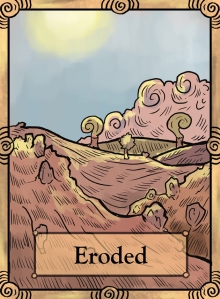Several academic papers have been written about Troubled Lands and its  predecessor The Farmers:
predecessor The Farmers:
- Analog Game Studies article explaining the logic of games with independent goals.
- Games Learning and Society Conference 2 page paper describing simulations of the cooperative, competitive, and independent versions of the game.
- Simulation & Gaming special issue article on climate change version of the game.
- Dissertation discussing the moral claims and moral foundations theory.
Facilitators may also find it useful to know the Inspiration behind Troubled Lands :
Troubled Lands – and in particular the independent goals version of Troubled Lands – is designed as an abstract simulation of political and ecological debates, such as those around climate change, water use, resource access, etc.
Representing the goals that nations and other political entities have is a major challenge when designing a game to simulate ecological debates. In these debates, leaders from each nation are free to make sacrifices that help other nations or that protect the environment, but they are not required to do so, thus the situation is not purely collaborative. Leaders can also try to outperform or compete with other nations, but this is also not required for success, thus the situation is not purely competitive. Yet, no matter what, leaders must do as well as they can to leverage their nations’ unique strengths and interests, and they must outperform any opposing political leaders in their own country, the people they will need to face in a future election. Thus, when designing a game about ecological debates, it does not make sense to represent this situation as either a collaborative or a competitive game, because leaders at ecological debates can succeed or fail independently of everyone else at the debate and because nations have vastly different strengths and interests. It does make sense, however to represent this situation as one in which some, all, or none of the players can win, and in which all the players are compared to a counterpart with the exact same abilities. This is the situation presented in the independent goals version of Troubled Lands.
To simulate the experience and feeling of being a leader in an ecological political debate, we needed to make a game in which players try to do their personal best and strive to attain a threshold that feels like the win/loss of an election. For this we needed a game in which players were not competing for a zero-sum victory (as in war), collaborating to attain a common goal (as with team efforts), trying to locate a hidden traitor (as with espionage situations), or trying to compete for a pool of economic rewards (as with corporate competition and economic gain). Having players compete with a counterpart in another group solved this issue. In this abstract representation, the counterpart from the other group represents a leader from an opposing political party in that politician’s own nation.
In addition to simulating the feel of an ecological debate, we wished to illustrate both how it is possible to trigger an ecological collapse that can harm everyone and how it is possible to suffer economically even if the ecosystem is sustained. Similar to ecological debates, loss for all players in the game is guaranteed if individual selfishness leads to the destruction of common resources, a phenomenon known as the tragedy of the commons. However, individual loss is ensured if players do not protect their own individual interests by acquiring an adequate amount of resources. This means that the extremes of pure self-interest and pure altruism are likely to fail in the game. It also means that players are likely to experience tension as they balance the multiple motivations of altruism, ecological sustainability, and self-interest.
Further, we wanted to simulate how it is difficult for leaders to arrive at consensus when nations have different special interests and abilities. To present this situation, the game contains asymmetries and inequalities that are a representation of the difference between the first and the third worlds – the rich and the poor – the oppressor and the oppressed, as a way to allow players to feel the tension between haves and have-nots. A by-product of including these differences is often that players have strong and varied moral claims. The values in the game (such as how much each player can plant and harvest) have been chosen so that players will have a difficult time arriving at an in-game definition of equality. These values have also been chosen to make it difficult for players to coordinate their actions and arrive at a steady state, a state of equilibrium in which players simply repeat the same patterns of actions.
The theme of the game could have been many things: for example, a house shared amongst multiple people or a corporation in which various divisions strive to meet goals using limited resources. The farming theme was chosen so the game would be more accessible to a wider audience, not as an attempt to precisely represent actual farming situations. The erosion element (the dice roll) in the game was kept random so that players would be able to debate the risk and uncertainty of the future – much as policy makers and skeptics debate the degree to which climate change will impact our own environment.
Several academic papers have been written on Troubled Lands. One illustrates the difference between collaborative, competitive, and independent game states. Another explores the modification of the game to represent second-order delayed effects (which are seen in climate change). Finally a thesis is in production analyzing the diversity of moral claims made during game play. These papers and materials for the game can be found at http://www.troubledlansds.com.
We continue to design games about politics and sustainability and invite your suggestions and comments. We can be reached at tom.fennewald@gmail.com and bkievitk@umail.iu.edu.